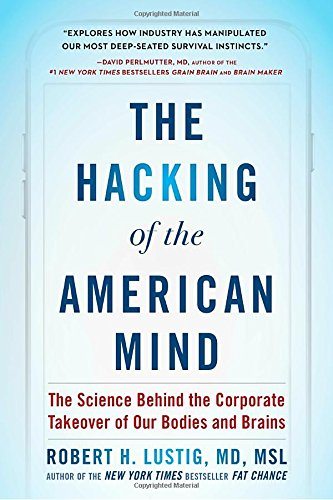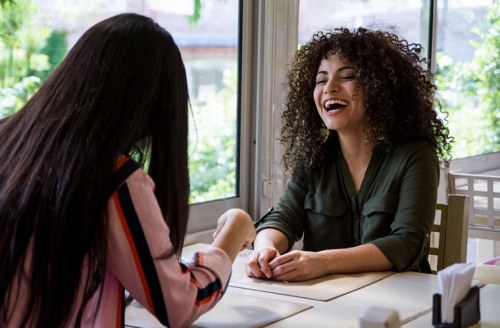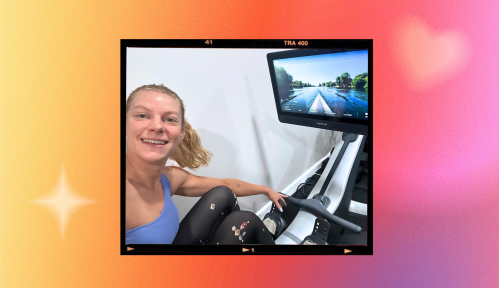Our editors independently select these products. Making a purchase through our links may earn Well+Good a commission

Depression is on the rise in the United States, particularly among teen girls. According to Robert Lustig, MD, MSL, and author of a new book called The Hacking Of The American Mind, a main culprit is society’s addiction to the rush that dopamine, a neurotransmitter which helps to control the brain’s reward and pleasure centers, can bring when triggered by things like social media, sugar and alcohol. With each sip, snack, or double tap, you get a quick mood boost.
But while these dopamine hits feel good in the moment, they’re also suppressing the serotonin in our brains, the chemical responsible for feelings of calm and satisfaction. Put another way, indulging in these pleasurable activities is actually making us unhappier in the long run.
If you’re confused about the difference between pleasure and happiness, you’re not alone. Dr. Lustig says the two ideas have been conflated just about everywhere, to some extent by design. Corporate America, he argues, has been selling us pleasure disguised as happiness for some time now—think Happy Meals, happy hour, and the smiling emojis we use to tell our friends we like what they do.
Corporate America has been selling us pleasure disguised as happiness for some time now—think Happy Meals, happy hour, and the smiling emojis we use to tell our friends we like what they do.
Dr. Lustig offers a rubric for determining whether that rosy feeling you have is happiness or pleasure: “Pleasure is short lived, happiness is long lived; pleasure is visceral, happiness is ethereal; pleasure is taking, happiness is giving; pleasure can be achieved with substances, happiness cannot be achieved with substances; and, finally, pleasure is experienced alone, happiness is usually experienced in social groups.”
So, how do you stop trying to find happiness in the very things that are sabotaging your odds of achieving it? Eradicating every dopamine-inducing behavior Dr. Lustig outlines is not only impossible, but unnecessary—dopamine and serotonin don’t have to be mutually exclusive. So instead, Dr. Lustig suggests that those in search of lasting, solid happiness focus on what he calls the four Cs.
Read on to learn about the 4 Cs for creating lasting happiness in your life.

Connect
According to Dr. Lustig, anything short of a face-to-face, IRL interaction is not a connection. “Email is not connection,” he says. “Facebook is not connection.” Why is this literal face time important? “You have a set of neurons in your brain, and when you’re interacting with someone in person you adopt the emotions of that person. This generates the phenomenon we call empathy, and empathy is necessary for producing serotonin,” Dr. Lustig says.

Contribute
“Contributing to something outside of yourself—and it has to be for non-personal gain: for the benefit of children, family, friends, and the world at large—helps to produce serotonin,” Dr. Lustig says. “Making money [alone] is not contributing.” However, he says, you can divine happiness from your work if “your boss [sees] how the work is doing good for others, and so do you.” If this isn’t the case in your career, you can get your needed serotonin boost in the contribution department by volunteering or even donating to charity. (Another reason to sign up for shifts at the local animal shelter: Walking the dog has also been proven to boost happiness.)

Cope
This bucket has to do with self care, with sleep taking center stage. According to Dr. Lustig, sleep deprivation increases cortisol and causes depression, which is why your zzz’s need to be prioritized. His top sleep tip? Unplugging. “Kids who charge their cell phone in their room get 28 minutes less of sleep per night, than those who charge their cell phone outside of their room,” he says. “If you have your cell phone sitting on your desk, it takes you three times as long to complete the test, so [having it close by at night] is clearly not good for sleep.”
Dr. Lustig also cautions against multitasking, which he calls the enemy of mindfulness. “Only 2.8 percent of people can actually multitask. Everyone else is serially uni-tasking—moving from one task to the next—and in the process they’re increasing their cortisol and creating depression.”
Finally, he recommends exercise as a big part of coping, as it tamps down cortisol. “Mindfulness plus exercise is better than SSRIs for alleviating depression.”

Cook
The final C is perhaps the most unexpected—cooking, Dr. Lustig says, is an essential part of any happiness-focused lifestyle. “There are three items in food that have to do with pleasure versus happiness,” he says. “Number one is tryptophan, which is the precursor to serotonin. It’s the rarest amino acid in the diet. You find it in eggs, some in poultry, and maybe a little in fish. Number two is omega-3 fatty acids, which are anti-inflammatory.” Though the reasons are unclear, he says that omega-3 deficiency has been shown in animals to inhibit serotonin transmission. “Finally, fructose depletes serotonin, ups your dopamine, and causes metabolic syndrome—it’s a total disaster,” Dr. Lustig says.
Basically, cutting out processed foods will make more than just your gut happy. “Processed food is low in tryptophan, low in omega-3s, and high in fructose. It’s the antithesis of contentment,” Dr. Lustig says. “But 33 percent of Americans don’t know how to cook, and if you don’t know how to cook, you’re hostage to the food industry your entire life.”
These 4 Cs, the keys to building lasting happiness, are “all things your mother taught you, which have gone by the wayside because technological, reward-driven culture has taken hold over the last 40 years,” Dr. Lustig says. But, clearly, none of them are as quick and easy as, say, posting an Instagram pic, so Dr. Lustig says if you’re going to start anywhere on your quest for happiness, it should be by turning your phone off for just one hour per day, preferably while you enjoy a meal with another IRL human. How quaint, and yet, also pleasurable. Or, rather, happiness-enabling.
Looking for more help with happiness? Find out why time is more valuable than money when it comes to your emotional health, try these 4 Buddhist-approved happiness hacks, and learn how to optimize your workouts to boost your mood.
Sign Up for Our Daily Newsletter
Get all the latest in wellness, trends, food, fitness, beauty, and more delivered right to your inbox.
Got it, you've been added to our email list.











